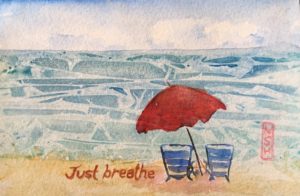There are not enough tears so why bother to cry! I was reading a book called Being With Dying and the author quoted a dying person as saying “It’s not death that’s hard, it’s the dying that’s a pisser.” Oh, yeah.
The last few days have been the worst. He hadn’t pooped in many days but had hardly eaten and had no discomfort. At first I wasn’t worried, but just in case, I asked the hospice nurse just to check him out Friday morning at 9 am. I so wish I hadn’t!!!!!
That check resulted in an enema that just hasn’t stopped giving. The nurse left at 10 am saying it might take til the afternoon. HA! Today, 53 hours later, we are still in a “go” mode. He’s spent his first days stuck in bed, mostly half or fully asleep, so very weak. In retrospect, this was too aggressive to do to an MSA patient.
Thankfully, his son Cody arrived Friday. I couldn’t have done it alone. The worse was not the messiness but the pain Larry was experiencing – stomach cramping, pressure sores being cleaned over and over. His face was in a grimace, the cords of his neck standing out rigidly.
And yet, because it’s Larry, there were still funny moments. When Cody and I did something incompetently in the midst of helping him and Larry snickered quietly. Or when we decided he really needed a shower but we couldn’t make it happen, and I suggested we strap him face down to the roof of the wheelchair van and take him through a car wash. Cody even promised we’d find a “Gentle Touch” carwash. Larry managed to raise his eyebrows.
 Then last night as we sat waiting for him to finish his breathing treatment and clean him for the last time before we went to bed, Cody started exploring the Hoyer lift that hospice had delivered. I showed him how it’s supposed to be used and why it didn’t work for us on a carpeted floor and with Larry being so tall. Cody decided to try it for himself.
Then last night as we sat waiting for him to finish his breathing treatment and clean him for the last time before we went to bed, Cody started exploring the Hoyer lift that hospice had delivered. I showed him how it’s supposed to be used and why it didn’t work for us on a carpeted floor and with Larry being so tall. Cody decided to try it for himself.
In he climbed, and up and down he went. Rides at Disney, right?
 This all sure feels like one of those rides I have always hated that make your stomach drop out.
This all sure feels like one of those rides I have always hated that make your stomach drop out.
And yet, when I can pause and stop doing, stop problem solving, I am able to bring more open-heartedness.
This morning I was reading a quote by Lao Tsu about the value of emptying your head, of non-doing. The doing is the benefit, the being is what matters.
Someone said wiping his ass is CNA work, not a job for a family member. That may be true. And yet sometimes, just maybe it is an act of love. Thankfully, our CNA is as caring and gentle as a family member. Certainly more skilled. We’re learning from her how to help Larry better.
There is a messiness to all of life we like to forget, prefer to avoid. We like it neat and tidy, without pain. Coming into the world is a messy painful process. I guess going out of it is too.Dying is a pisser. And there’s a lot of messiness and pain throughout life, if we are really present to it.
I don’t know if this is Larry’s time to go. Or if he will revive and we will go through this again. I do know there is something for me to learn here.
I do know that I am a part of him and he is a part of me, and a part of many others in this world, who’ve known him, loved him, admired his grace and fortitude throughout his life and throughout this process. When his body goes, today, tomorow, next week, next year – whenever, he will still be within us, within our hearts.
I just have to stay open and be present.

 What will today bring? It was a night from hell.
What will today bring? It was a night from hell. So this week, my husband was choking and lost consciousness. We were eating dinner. It was his last bite. Usually if he has any trouble swallowing, I help him to stand up and just straightening up seems to clear things. This time I got him standing but he stopped breathing and collapsed on me. I had to lower him to his chair then drag him from the chair to the floor without dropping him or hitting his head on the tiles.
So this week, my husband was choking and lost consciousness. We were eating dinner. It was his last bite. Usually if he has any trouble swallowing, I help him to stand up and just straightening up seems to clear things. This time I got him standing but he stopped breathing and collapsed on me. I had to lower him to his chair then drag him from the chair to the floor without dropping him or hitting his head on the tiles. For the last few days we seemed to have achieved our new normal. I say that hesitantly with the hopes of not jinxing it.
For the last few days we seemed to have achieved our new normal. I say that hesitantly with the hopes of not jinxing it. Today I read that being fully present with someone who is dying is the ultimate act of love.
Today I read that being fully present with someone who is dying is the ultimate act of love. Fear and exhaustion in the hospital go hand in hand and this is our 7th day. It’s frightening for us both that he isn’t breathing better. It’s exhausting for him to find it so hard to breathe and exhausting for me to be sitting at his side, then driving the 25 minutes back and forth, nevermind the emotional toll.
Fear and exhaustion in the hospital go hand in hand and this is our 7th day. It’s frightening for us both that he isn’t breathing better. It’s exhausting for him to find it so hard to breathe and exhausting for me to be sitting at his side, then driving the 25 minutes back and forth, nevermind the emotional toll. We are struggling to make an appropriate care choice for Larry’s labored breathing. He say it feels like he’s choking. It sounds like he’s drowning. It’s painful to us both.
We are struggling to make an appropriate care choice for Larry’s labored breathing. He say it feels like he’s choking. It sounds like he’s drowning. It’s painful to us both. I wish we had more medical support. More medical answers. Managing symptoms is SO FRUSTRATING!
I wish we had more medical support. More medical answers. Managing symptoms is SO FRUSTRATING! I hate when we are switching medicines around! That’s what happened this weekend. New med – new problem. My husband woke up with a painful leg – thought he’d just slept on it funny at first.
I hate when we are switching medicines around! That’s what happened this weekend. New med – new problem. My husband woke up with a painful leg – thought he’d just slept on it funny at first.